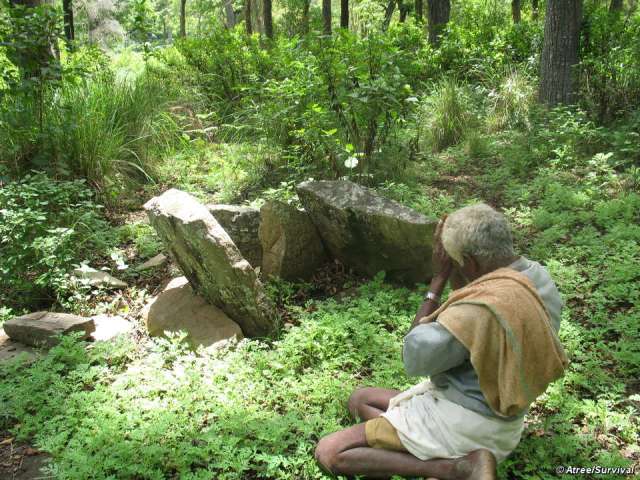
Learn more about the Soliga community in Karnataka >>

“We have a special responsibility to document, monitor and conserve our most precious asset” – Kamaljit S. Bawa in “Our biodiversity, our life, our future” >>
Survival on 2 November 2011 (the organization working for tribal peoples’ rights worldwide)
Indian tribe secures unprecedented rights to tiger reserve
In a landmark victory, a tribe in India has for the first time had their right to use their ancestral land recognized – even though it is inside a tiger reserve.
In 1974 members of the Soliga tribe were evicted from their homes in the Biligirirangan Hills, Karnataka state, by a local government intent on protecting the state’s wildlife.
But now the Soliga’s right to collect, use and sell forest produce from within the Rangaswami Temple Sanctuary reserve has been formally confirmed. […]
The Soligas are now working on a proposal to manage the tiger reserve jointly with the Karnataka state authorities, using their traditional knowledge.
About 20,000 Soligas live in Karnataka state, and have been inextricably linked to the Biligirirangan Hills for generations.
Survival’s Director Stephen Corry said today, ‘The Indian government is beginning to realize that tribal peoples are the best conservationists, by far. If only the rest of the world could catch on. Evicting tribespeople from their ancestral land in the name of ‘conservation’ is not only illegal and destroys them, it also spells disaster for the local environment and wildlife.’ […]
Source: Indian tribe secures unprecedented rights to tiger reserve – Survival International
Address : https://www.survivalinternational.org/news/7843
Date Visited: 23 December 2020
Learn more about the Soliga community >>
Find up-to-date information provided by, for and about Indian authors, researchers, officials, and educators
List of web portals covered by the present Custom search engine
Ashoka Trust for Research in Ecology and the Environment (ATREE) – www.atree.org
Freedom United – www.freedomunited.org
Government of India (all websites ending on “.gov.in”)
Kalpavriksh Environmental Action Group – https://kalpavriksh.org
Shodhganga (a reservoir of Indian theses) – https://shodhganga.inflibnet.ac.in
Survival International – www.survivalinternational.org
UCLA Digital Library – https://digital.library.ucla.edu
Unesco – https://en.unesco.org
Unesco digital library – https://unesdoc.unesco.org
Unicef – www.unicef.org
United Nations – www.un.org/en
Video Volunteers – www.videovolunteers.org
WorldCat (“the world’s largest library catalog, helping you find library materials online”) – https://worldcat.org
To search Indian periodicals, magazines, web portals and other sources safely, click here. To find publishing details for Shodhganga’s PhD search results, click here >>
Search tips
Combine the name of any particular state, language or region with that of any tribal (Adivasi) community.
Add keywords of special interest (music, poetry, dance just as health, sacred grove and biodiversity); learn about the rights of Scheduled Tribes such as the “Forest Rights Act” (FRA); and the United Nations “Declaration on the Rights of Indigenous Peoples”, “Universal Declaration of Human Rights”, “women’s rights”, or “children’s right to education”.
Ask a question that includes “tribal” or “Adivasi”, for instance: “Adivasi way of life better?” (or “tribal way of life worse?”)
Specify any particular issue or news item (biodiversity, bonded labour and human trafficking, climate change, ecology, economic development, ethnobotany, ethnomedicine, global warming, hunter-gatherers in a particular region or state, prevention of rural poverty, water access).
For official figures include “scheduled tribe ST” along with a union state or region: e.g. “Chhattisgarh ST community”, “Himalayan tribe”, “Scheduled tribe Tamil Nadu census”, “ST Kerala census”, “Particularly Vulnerable Tribal Group Jharkhand”, “PVTG Rajasthan”, “Adivasi ST Kerala”, “Adibasi ST West Bengal” etc.
In case the Google Custom Search window is not displayed here try the following: (1) toggle between “Reader” and regular viewing; (2) in your browser’s Security settings select “Enable JavaScript” | More tips >>
Note: hyperlinks and quotes are meant for fact-checking and information purposes only | Disclaimer >>
Some clarifications on caste-related issues by reputed scholars >>
Tips for using interactive maps
Toggle to normal view (from reader view) should the interactive map not be displayed by your tablet, smartphone or pc browser
For details and hyperlinks click on the rectangular button (left on the map’s header)
Scroll and click on one of the markers for information of special interest
Explore India’s tribal cultural heritage with the help of another interactive map >>